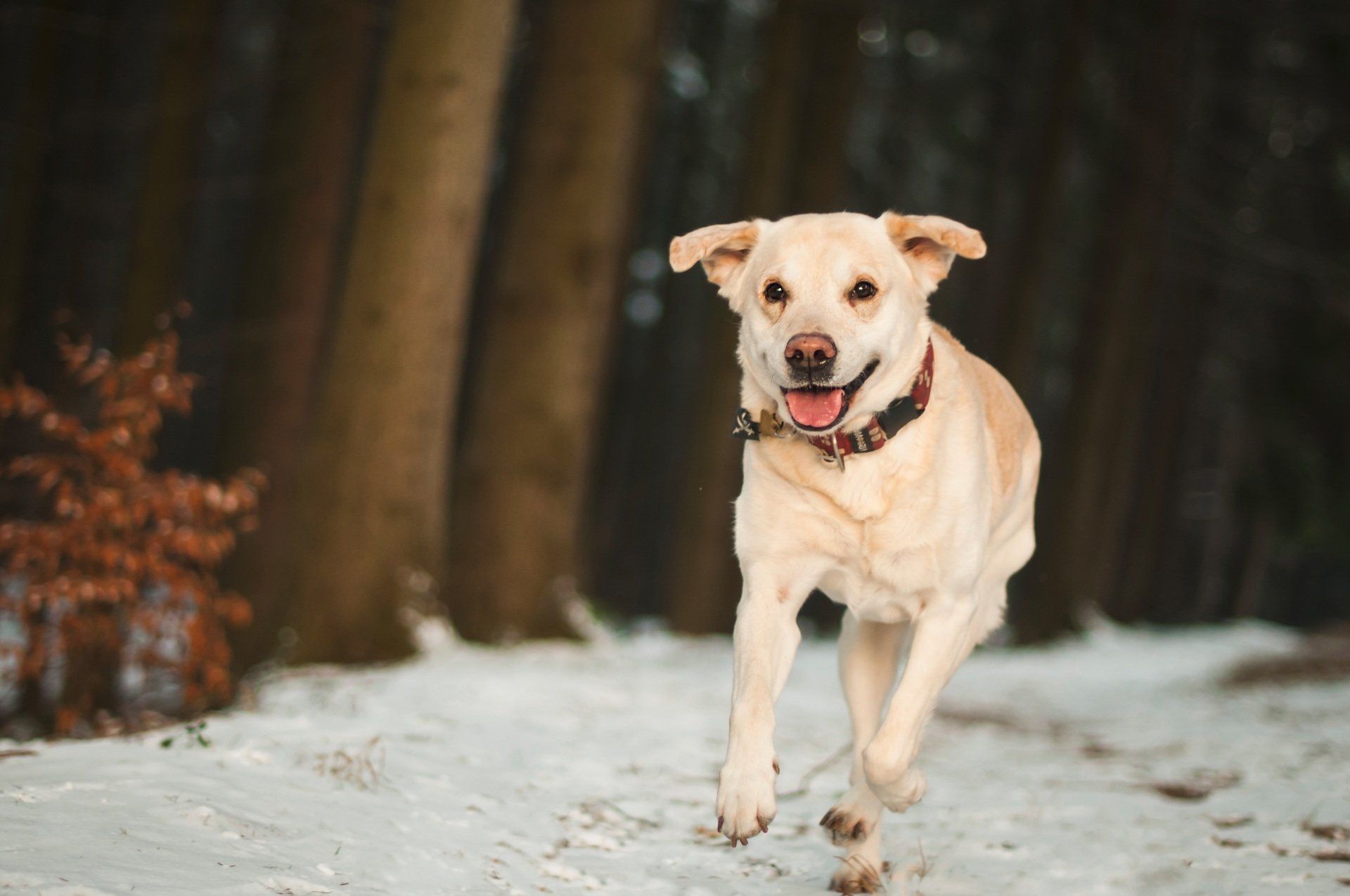6 Winter Dangers for Dogs: What to Watch Out For

When Old Man Winter comes to town, it’s always wise to stay informed on major winter dangers for your pups. You should always keep this knowledge in mind if you enjoy walking and being active outdoors during the winter with your fur baby. And while some dog breeds are better able to handle cold weather, even those dogs are not immune to extreme cold weather and seasonal needs.
From frozen lakes, rock salt, frostbite, and hypothermia in dogs to the risks of leaving out rat poison or antifreeze—we'll cover them all. Understanding the various winter dangers for your dog will help ensure your beloved pups stay safe throughout the cold winter months.
1. Mouse and Rat Poison
To answer the question, “is rat poison dangerous to dogs,” the answer is an unequivocal YES. Any poison is probably the most serious threat of all the potential winter safety hazards. As temperatures drop, vermin often make their way into our homes. Do NOT place any type of mouse or rat poison in ANY location where your dogs can get to it. Ingesting any amount could be fatal. Instead, find an alternative but safe solution for your pest control.
Be aware of symptoms that your pet may have consumed poison, such as:
- difficulty breathing
- coughing
- lethargy
- vomiting
- blood in their stool.
If you think your dog may have ingested rat poison, call your local veterinarian right away!
2. Antifreeze
Another question dog owners may consider is, “is antifreeze dangerous to dogs.” We understand it’s a necessary product to keep motors running, BUT it’s critical to keep this product OFF of the floor in your garage or anywhere your pup can reach it. Antifreeze tastes sweet to dogs, and they may want to lick any spillage or the bottle. Ingesting this harmful chemical can be potentially fatal. Although brands are now adding bitterant to deter pets from ingesting antifreeze, it’s still not a safe product, and it’s not worth the risk of leaving it accessible to your pets.
The earliest signs of antifreeze poisoning are:
- Lack of coordination or stumbling
- Vomiting or nausea
- Twitching muscles
- Lethargy or depressive behavior
- Low body temp
- Excessive thirst and urination
- Rapid eye movement
If you notice any of these signs, call your local vet immediately or take your dog to an emergency vet clinic.
3. Hypothermia
Hypothermia in dogs can occur if your pup has been left out in cold weather for too long. Your dog needs a warm shelter that they can easily access.
Dog signs of hypothermia include:
- Having a body temperature lower than 37.5°
- Weakened state
- Excessive or uncontrolled shivering
If you think your dog may have hypothermia, follow these steps:
- Warm your dog right away. You can use towels or blankets heated in a dryer, wrap a plastic bottle filled with warm water or a heating pad inside a towel, fill a baggie with uncooked rice and warm it in a microwave for 1 – 2 minutes, then wrap your pup a towel, or set a hair dryer on medium warm.
- Monitor your dog's temperature every 10-15 minutes. Once the temperature is normal, you can stop the extra warming.
- You will still want to take your dog to your veterinary care specialists as bladder and kidney problems can occur from the incident.
4. Frozen Lakes and Ponds
When letting your dog roam around off their leash during a walk, even on your property, it's important to keep them AWAY from any frozen body of water. There are multiple dangers associated with frozen bodies of water. Their paws can get cut on sharp ice ridges. They can hurt themselves by slipping on the ice. They could fall through and develop hypothermia or, worse, drown. It’s important that if your dog falls through the ice, you do not go onto the frozen surface to get them. Your weight will likely break the ice further, and you could also fall in. Call out their name and encourage him to pull himself out, or try using a leash, a long stick, or some other item to give them something to latch onto. Also, if they’ve fallen in, immediately get them to a warm place and dry them off quickly.
5. Rock Salt
Is rock salt dangerous to dogs? Winter weather also brings on icy surfaces, and it is vital to know if this seemingly harmless product can harm your fur baby. It may seem the least concerning of the winter dangers for dogs, but the salt granules can get stuck in their paws, causing discomfort or leading to sore, cracked paw pads. Whenever your dog walks on rock salt, clean her feet right away. They could ingest the chemicals if they lick the brine off their fur or paws. These chemicals can be toxic to them. As a preventative measure, you could treat paws with a thin coat of petroleum jelly or balm that is shown to be safe for use on a dog’s skin before going outside.
6. Frostbite
Unlike hypothermia, frostbite is a cold weather danger that directly affects the skin. Look for signs of frostbite on the areas of your dog with the least amount of fur… feet, ears, and tail are the most likely areas to suffer first.
Signs of frostbite in your dog include:
- Pale skin
- Scaly or red skin
- Shriveled or cracked skin or paw pads
Similar to hypothermia in dogs, if you see evidence of frostbite, follow these steps:
- Use a warm towel (not hot) to massage the affected areas gently. (See above for ways to warm your dog.)
- If the affected area is nearly or all the way frozen, gently warm the area with warm water. You should not overheat the water. Water over 90° is too hot.
- Seek veterinary care as soon as possible.
What to Do if You Suspect Any of These Dangers Affecting Your Dog
If your dog faces any of these winter dangers, you must take IMMEDIATE action. Your local veterinarian can offer the right and proper advice and treatment accordingly and help keep your pooch protected.
Chipman Road Animal Clinic is Your Go-To Vet in Lee's Summit, MO!
Lee’s Summit and Kansas City pet owners need not worry about the winter dangers for dogs. At Chipman Road Animal Clinic, we are 100% committed to delivering the absolute best veterinary care. It is evident in every aspect of our service that we love and care for our dogs and cats. Give us a call today at 816-524-1886!
Contact Us
Chipman Road Animal Clinic
211 NW Chipman Rd
Lee's Summit, MO 64063
Phone: 816-524-1886
Fax: 816-524-7523
Office Hours
Monday: 7am-6pm
Tuesday: 7am-6pm
Wednesday: 7am-6pm
Thursday: 7am-6pm
Friday: 7am-6pm
Saturday: 8am-12pm
Sunday: Closed
Doctor Hours
Monday: 8am-6pm
Tuesday: 8am-6pm
Wednesday: 8am-6pm
Thursday: 8am-6pm
Friday: 8am-6pm
Saturday: 8am-12pm
Sunday: Closed
For after-hour emergencies, please contact one of our recommended partners:
MO: Blue Pearl Animal Hospital - Open evenings and over night, call (816) 554-4990
KS: Mission Veterinary and Emergency - Open 24 hours, call (913) 722-5566
All Rights Reserved | Website Design by Digital Marketing Inc | Copyright

